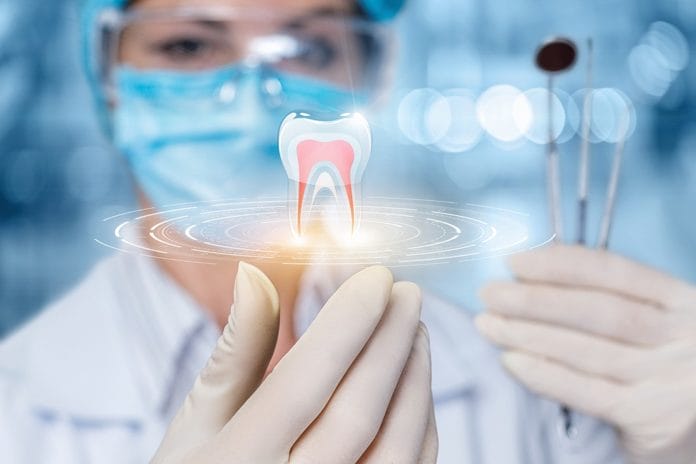In part three of our series, we move our way up the ranks to a hygienist who has many years of experience under her belt. Kimberlee Faria, RDH, is a Massachusetts native who has been practicing for 30 years. She graduated from dental hygiene school in 1990.
To view the previous articles in the Different Stages of Career series, click here and here.
Kim has always worked in the clinical sector in a few private practices. She now works in two offices − a pediatric office and general practice. At her pediatric office in Rhode Island, she has worked four days a week for over 25 years.
“I have actually been there longer than my boss,” she mentions. Her employer bought the practice from the previous boss 18 years ago.
Additionally, Kim has been at her Friday office for about five years. It started as a temporary job in Massachusetts when they needed her and turned into a regular Friday schedule about almost three years ago.
Machado: What got you into dental hygiene?
Faria: I actually decided in sixth grade that I wanted to work in dentistry. I loved my dentist as a child − and my hygienist as well. I never changed my mind and set forth to make it happen. I really don’t know what I would do if I wasn’t a dental hygienist, but definitely something still in healthcare.
Machado: What’s one thing you remember from dental hygiene school? Good, bad, or funny?
Faria: I remember our clinical director pronouncing fluoride. “FLU- O -RIDE.” I still hear it in my head when I write it! Also, I have a late birthday. Back then, the cut-off for school was December. I graduated high school when I was 17 and went right into hygiene school from there. You could do that back then. We started working on each other in November, and I was still 17. I had to take my medical history home to have my dad sign it to give them permission to work on me!
Machado: What’s one thing you wish you knew before going into dental hygiene?
Faria: I didn’t realize how hard this job is on the body. No matter how we try good posture, my back and shoulders feel it. I go for massages fairly regularly. Not just as a way to relax, but as a very needed service to keep my body working. Massages have become necessary, and not just a luxury.
I am very fortunate that, after 30 years of working, I have not had any wrist issues. I attribute it to the fact that I am ambidextrous. I feel that, because I switch hands several times when scaling, I have never just put all the work on one hand.
About a year and a half ago, I got my first pair of loupes though. I quickly realized how much I was slouching. Now with the loupes, they force me to sit up. They have done wonders for my shoulders and neck. I think they help those areas much more than they do my eyes!
Machado: Do you have any memorable clinical stories?
Faria: So many! My main job is mostly kids, so there are a lot of stories there. I’ve been thrown up on, hugged, and bitten − one too many times. I have cat-like reflexes.
One interesting story is from my very first job. We had lost power. This was way before loupes with lights. My boss came through and gave everyone flashlights. The patients held them, and we continued to work. Crazy, I know. We were part of a complex with several specialties. The office next door assumed we were just hanging around waiting for the lights and ran through with squirt guns. Fortunately, everyone thought it was funny, patients included. My boss realized that we should stop and wait for power.
Machado: Describe your first job out of hygiene school? Was it a good or bad experience?
Faria: My first job was in a perio office. I learned a lot about periodontal therapy right out of the gate. I was 19 when I started and very nervous. But I gained valuable work skills in that office. I still keep in touch with my boss even though I left that office 25 years ago.
Machado: What’s an obstacle or challenge you have faced at work, such as patient compliance, a fellow employee, or an insurance company?
Faria: Insurance companies are tough, especially when dealing with children. Many parents don’t want services that aren’t 100% covered, and, many think that if the insurance company doesn’t cover it, it must not be necessary. One thing I have always hated is talking about money in the clinical area, but it ends up coming up when a service is recommended, and the patient wants to know insurance coverage and cost as part of their decision making.
As far as patient compliance, I’ve learned over the years that you can lead a horse to water but you can’t make them drink. I used to get aggravated with patients who either don’t floss as they should, don’t keep regular appointments, don’t get the necessary restorative work, etc.
While these things still do annoy me, I’ve learned to just remember that part of my job is to educate. And I do that. I always make sure the patient knows what they need to know, but it’s in their hands. It’s their mouth.
I guess this is also some advice I could give younger hygienists. Don’t take it personally if your patient doesn’t take care of their mouth the way you have told them to! When I was younger, I hated that aspect of it, and often felt like a ‘maid’ every six months, cleaning up their mess. But I realize now that there will always be calculus to scale. All I can do is make sure I give them the best chance at health and send them on their way. The rest is up to them!
Machado: What’s the biggest lesson you have learned from your dental hygiene career experience?
Faria: I would have to say teamwork and humility. The practice that I have worked in for 25 years is great for that. We all have our individual jobs, but the lines between assistant and hygienist and the even dentist often overlap as we all help each other with set up, clean up, sterilization, and even walking to the dumpster with trash.
Working as a team in dentistry is so important. It just takes one negative attitude to mess up a whole day.
Machado: What’s your advice to a new grad? A future dental hygienist? Or a dental hygienist with a few years under their belt?
Faria: You have to love this job. I can honestly say that, after 30 years in this business, I still love what I do. I have been very fortunate to work in offices where I have had awesome bosses. There have been bumps in the road, of course, with coworkers along the way, but I try to maintain a positive attitude as much as I can.
My advice would be to remember why you chose this job in the first place. If there are issues at work causing strife, bring it to the doctor’s attention sooner rather than later. It’s often something that can be easily fixed if you are honest and open.
Machado: What’s the proudest moment in your career so far?
Faria: Being recognized by my boss for 25 years of work. She threw a dinner for me and was genuinely grateful for all my hard work helping to make her practice what it is today.
Machado: What’s next for you in your career?
Faria: Well, I’ll be 50 this year and I am working 41 hours a week. I am in one office four days a week and another office on Fridays. I love both jobs. My plan is to keep working as long as I can. I assume as the years go on, I may cut down the days. But until I can’t work, my plan is to work. I have never had any desire other than clinical dental hygiene. So that is what I will do.
Machado: Where do you see the dental hygiene profession in 10 years?
Faria: I hope that it remains an important part of dental health. There have been many changes throughout the years. Advances in preventative care, advances in our equipment, the need for heightened infection control, but I feel that we are still a very needed and valued part of the patient’s health.
Machado: Is there anything you wish you could change about the profession?
Faria: Nothing specific. I’ve been doing this for a long time. There have been changes along the way. I usually just roll with it. Like right now, with the coronavirus, there are things about working in health care that are difficult right now. But we will get through it. I love my job more now than I did when I started.
Machado: What is your favorite part of being a dental hygienist?
Faria: My favorite thing is my patients. I have met so many interesting people over the years! And I love making a difference with their dental health.
I previously said that I work with a lot of children. I love it when a child starts out really scared, and I am able to get them through the appointment and get a smile and a hug at the end. I also love being part of a work family. I have been fortunate to have good ones!
Machado: Any other comments about your experience, perspective, advice, feedback, etc.
Faria: Overall, I can say I am very happy that I chose this profession. I always get excited when my high school patients show an interest in hygiene. It’s a great career. It can be very flexible. I cut down to three days a week when my kids were smaller, and now work five because I can.
I love meeting all different types of people and working in a small office setting. I feel for people who don’t love their job. You spend so much time at it. One thing I always tell young people thinking about college and careers: find something you like to do. If you can make a career doing that, do it. You may never be rich but getting up and going to a job you hate every day is no way to live.
Conclusion
Between the three hygienists interviewed thus far, each of their answers echoed some similar key points. Each reported that if they were not dental hygienists, they would still be in the health field in some way. They have all faced difficulties with insurance not covering needed treatment plans.
Additionally, they remind people who are wondering if the career is for them to make sure they enjoy what they do. There are physical demands in this industry, so we also cannot forget self-care. I believe many hygienists can agree to these conclusions. The overall message is that dental hygiene is very rewarding no matter what stage you are in your career.











